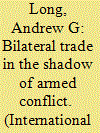| Srl | Item |
| 1 |
ID:
082058


|
|
|
|
|
| Publication |
2008.
|
| Summary/Abstract |
Does the shadow of war decrease trade? I examine the influence of conflict on bilateral trade and argue that trading firms' expectations of armed conflict, both within and between nation-states, should decrease trade along with armed political violence. By assuming that firms care about future profits and assess the likelihood of a domestic or interstate conflict in the future that could disrupt trade, I argue that increasing the expectation of a domestic or interstate conflict raises the transportation, transaction, and production costs of trade. Empirically, contemporaneous trade levels should be negatively related to trading firms' beliefs about the likelihood of domestic and interstate conflicts in the future. Statistical tests, using bilateral trade data from 1984 to 1997, show that expectations of domestic or interstate conflict, in addition to violent armed conflicts, are negatively correlated with bilateral trade levels. Theoretically and empirically, this research advances our understanding of the trade-conflict relationship by demonstrating how trading firms' expectations about future conflict reduce bilateral trade levels
|
|
|
|
|
|
|
|
|
|
|
|
|
|
|
|
| 2 |
ID:
072703


|
|
|
|
|
| Publication |
2006.
|
| Summary/Abstract |
The authors appraise a well-known argument connecting economics and security in international relations: military allies are likely to trade more with one another than non-allies. A review of alliance treaties and diplomatic history suggests that, under certain conditions, states may tie together alliance agreements and economic agreements. When states explicitly link alliance agreements with economic cooperation, one would expect to see increased economic exchange coinciding with coordinated security policies. This article evaluates whether the linking of economic and security agreements accounts for a positive relationship between alliances and trade among European states before World War II and produces evidence in support of this argument. Trade among allies who have specified economic cooperation in their alliance agreements is higher than trade among non-allied states and higher than trade among allies who have not promised economic cooperation. In contrast, trade among allies without specific economic provisions in their treaties is statistically no different from trade among non-allies. Thus, the positive empirical relationship between alliances and trade that the authors find in pre-WWII Europe is a result of only a specific subset of all military alliances, namely, those treaties that stipulate economic cooperation between the allies. This study advances our understanding of the alliance-trade relationship by focusing attention on the joint negotiation of cooperation in different issue-areas.
|
|
|
|
|
|
|
|
|
|
|
|
|
|
|
|